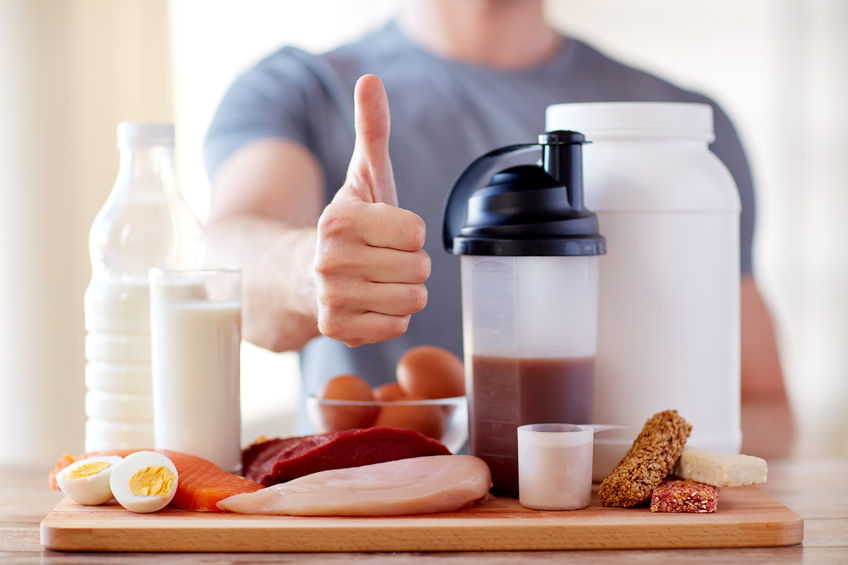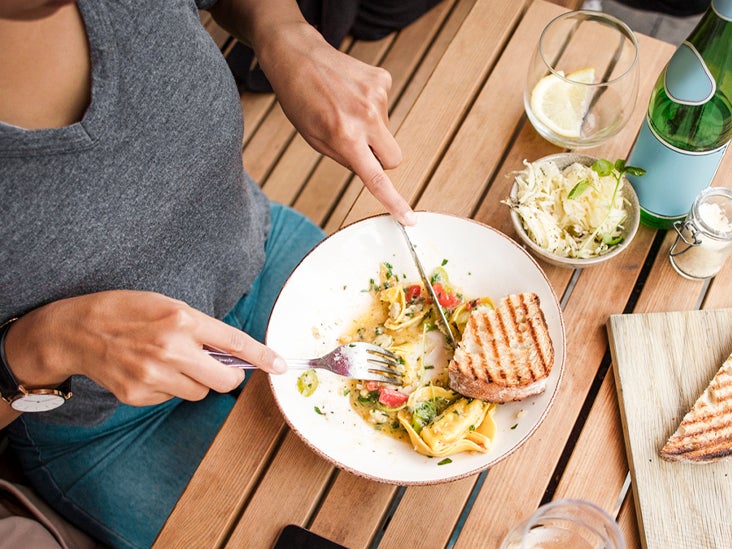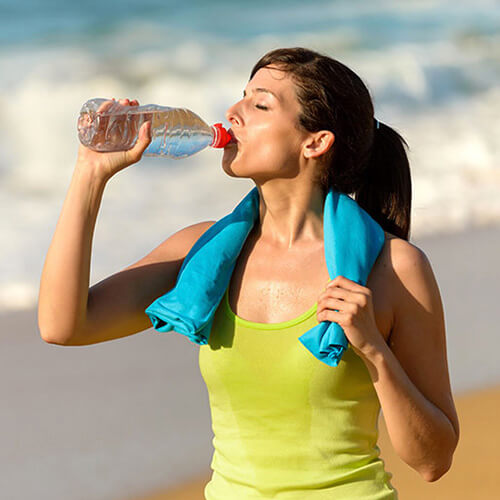Simple Nutrition Rules to Get Stronger and Build Muscle
Nutrition can be so confusing.
Several decades ago, fats were bad. Then carbs became bad. Now gluten is the source of all evil. Red meat has gotten a bad rep too. Meanwhile bodybuilders tell you to eat every 3 hours while intermittent fasting has gotten popular…
What are you supposed to eat? It all seems so complicated and contradicting.
But this is a fairly new problem. Through human history, people didn’t spend a lot of time thinking about what to eat. They knew. Because they followed eating habits formed through childhood. Eating habits they received from their family and that was part of the food culture.
This guide is about that. I’m going to share simple nutrition habits that I follow to be strong in the gym, and maintain a muscular and lean physique – without spending hours in the kitchen, or stressing over what I eat.
Eat Mostly Unprocessed Foods

Unprocessed foods have been unaltered – you can buy them in their natural state.
An example of an unprocessed food is an apple that was just picked up from the tree. The only processing is to wash the apple, then you can eat it.
Compare that Apple with Apple Jam bought from a supermarket. It’s rare for that apple jam to contain only apples. Usually the list of ingredients on the back is long – in most cases all kind of things were added on top the apples, including preservatives and sugars.
The main benefit of eating unprocessed foods it that you have better control over how many calories goes into your body. Most processed foods have hidden calories in the form of hidden sugars and fats. This may be good for people wanting to gain weight, but not if you want to maintain or lose weight.
- Unprocessed foods: fresh meat, fish, poultry, eggs, veggies, legumes, fruits, rice, oats, quinoa, …
- Processed foods: fruit bars, cereals, frozen pizza, cookies, sausages, frozen meals, …
The first nutrition rule is to focus on eating unprocessed foods as much as possible. It’s okay to eat cookies once in a while. I do it. But most meals you eat should consist of unprocessed foods so you have better control over how many calories get into your system.
Eat Protein with Each Meal

Protein is crucial for getting results when lifting weights. Without enough protein you don’t get proper recovery, and will not get proper progress.
Protein also helps with fat loss – it keeps you full longer, and has a higher thermic effect (more of your meal is burned for digestion if it’s higher protein).
Luckily you don’t need that much protein. You only need 0.82g of protein per lb of body-weight (1.8g/kg) for muscle recovery and to build extra muscle mass.
That means about 145g of protein if you’re 80kg/176lb.
The easiest way to get your daily protein intake is to eat a whole protein source with each meal
- Red Meat. Beef, pork, lamb, deer, buffalo, etc.
- Poultry. Chicken, turkey, duck, etc.
- Fish. Tuna, salmon, sardines, mackerel, etc.
- Dairy. Milk, cheese, cottage cheese, quark, yogurt, whey, etc
- Eggs
Eat Veggies with Each Meal

Veggies are low calorie. Salad actually has “negative calories” – it takes your body more energy to digest and absorb the food, than there are calories inside.
This makes veggies excellent for maintaining or losing weight (not for gaining weight though). Because you can eat your stomach full of veggies, so you don’t feel hungry, but while getting zero to no calories in.
A good goal is to have at least half your plate filled with veggies. This is the other benefits to eat veggies with each meal: it will push other things out of your plate. Most people eat way too many carbs because they’re easier to cook and cheaper. But carbs are higher in calories.
By aiming to eat at least half a plate of veggies each time, you are pushing other food sources out of your plate, and thus limiting how many calories you get. This makes it easier to maintain or lose weight.
Vegetables also have vitamins and minerals to help with recovery from lifting. And they have fiber to help with digestion.
Some of the best vegetables for lifters are:
- Broccoli
- Spinach
- Salad
- Kale
- Cabbage
- etc
If you hate veggies, learn to use spices and condiments. Stop steaming and boiling, it tastes disgusting that way. Grill the vegetables and add a tbsp of olive oil, with pepper and salt.
Limit Your Carb Intake

100g of pasta or rice or bread has almost 400kcal. That’s before you add any topping. Those calories are fine if you want to gain weight, but not for maintaining or losing weight.
To keep your weight under control, you need to control how many calories you eat. The easiest way to do that is by controlling your carb intake.
You should not stop eating carbs. Low carb diets are popular, but few people can stick to them long-term.Because carbs are everywhere and most people like their taste. I like bread, I like pizza, I like oatmeal. I don’t want a life without pizza. And I’m not going to eat fake cabbage crust pizza.
Keep eating carbs but limit their intake. One simple rule is to eat carbs only once per day, like after your workout. You don’t need to eat bread or rice or pasta three times a days unless you’re looking to gain weight. Once a day is enough for most people looking to gain or maintain weight.
If you followed the first rule, you’re only getting carbs from unprocessed food sources. These would be the best:
- Rice
- Pasta
- Bread
- Potatoes
- Quinoa
- Oatmeal
Eat Good Fats

Fat doesn’t make you fat. Excess calories do.
So you can eat real butter, whole eggs and full-fat yogurt.
Because you’re going to lift heavy weights three times a week, and eat unprocessed foods most of the time.
So a little saturated and cholesterol is not going to cause cardiovascular disease.
You do not have to eat fat-free yogurt or split the yolk from the eggs. Low fat food is tasteless. Just go full-fat. It will keep you full longer.
Eat also omega-3 fatty food sources like fatty fish (salmon, tuna, mackerel, sardines, etc).
Drink Water

You sweat when you lift weights, especially once the weights get heavy. You need to drink water to get all the fluids back that you lost through sweating. And you need water for proper muscle recovery.
Dehydration from lack of drinking will cause headaches. The same kind of headaches that you get after a night drinking (alcohol dehydrates). Headaches make it harder to motivate yourself to train, to get your reps, and to progress. You need to drink.
How much water you need depends on how much you sweat, which depends on the season and where you live. If I train in Bangkok, Thailand during the summer, I’m going to sweat more and easily drink 3-4 bottles of water. But I’m probably only drinking a 3 liters a day when it’s winter in Belgium.
You don’t need all those sugary drinks. This is not long-endurance training. This is lifting weights. The workouts are short, and you’re spending most of the time resting between sets.
Just take a bottle of water to the gym. Sip on it during your workout. I usually drink about 1.5l during my workout (but I live mostly in Asia now where it’s hot most of the time).
Then start your day by drinking two big glasses of water. If you drink somewhat during the rest of your day, you should get about 3 liters a day which should be enough.
Don’t Chase Perfection
You don’t need to be perfect with your diet. 80% of your results will come from following the above rules.
Trying to chase 100% perfection will set you on failure. Because no-one can stick to that. You will deviate. Someone will present you cake. You won’t be able to eat right in certain situations.
The problem happens when you think that breaking the rules equals not getting results. A lot of people end up binging or giving up because of that. That’s stupid and unnecessary.
I eat burgers, pizza’s and cakes. Because I like it. I don’t feel terrible when I do. I just eat them infrequently, and go back to following the above nutrition rules right after that.
Have a treat once in a while. Just don’t do stupid stuff like all-you-can eat buffets. One cake, then done. One pizza, then done.
Frequently Asked Questions
What Should I Eat?
80% of your results will come from eating the right amount of calories, and getting enough protein. The rest is details.
However you do want to focus on quality foods so you get vitamins, minerals, fiber, etc. So you should eat mostly whole, unprocessed foods. Examples:
- Meat, Poultry & Fish. Steaks, ground round, chicken breast, tuna, mackerel, …
- Dairy. Whole eggs, cottage cheese, plain fat free yogurt, milk, …
- Whole Grains. Oats, rice, quinoa, pasta, …
- Healthy Fats. Olive oil, mixed nuts, fish oil, real butter, …
- Fresh Fruits & Veggies. Spinach, broccoli, bananas, apples, oranges, …
What should I not eat?
Again, what matters most is how many calories you eat, and getting enough protein. If you want to avoid eating too many calories, watch out with processed foods. These foods are usually also poor in vitamins and fiber. Examples…
- Packaged Snacks. Chips, cakes, cookies, crackers, sugar coated nuts, …
- Processed Meats. Hot dogs, bologna, sausages, lunch meats, …
- Calorie Beverages. Sodas, fruit juices, sugar alcohol, …
- Pre-made Meals. Frozen meals, cans of ravioli, pizzas, …
- Deep Fried Foods. French fries, fish sticks, fried seafood, …
- Junk Food. Ice cream, Mc Donalds, kebab, …
- And all that other crap like margarine, sugary breakfast cereals, …
Do I need to eat a meal every 3 hours?
No. It’s fine if you eat breakfast, lunch and dinner, with maybe one snack in the afternoon. It’s also fine if you don’t eat breakfast but do Intermittent Fasting. What matters most is that you eat sufficient calories per day, and get your daily protein.
Do I need to drink a protein shake post workout?
No. There’s nothing special in protein shakes. The whey is just dairy protein, similar to what you get from eating cheese/yoghurt or drinking milk. You do not need fast-digesting protein post workout for better muscle recovery. You can just eat a regular solid meal that consists of protein and carbs (meat and rice with vegetables for example). The only benefit of drinking protein shakes is that they’re fast to make and portable. Personally I just just go home post-workout and eat oats with milk, yoghurt and fruit.
What’s an example meal plan?
These could be what you’d eat on workout days:
- Breakfast: eggs with veggies
- Lunch: chicken salad
- Snack: mixed nuts, banana
- Post workout: oatmeal, apple, milk, yogurt
- Dinner: steak, veggies, potatoes
Non-workout days would be a meal less. If you do Intermittent fasting like me, then it’s only three meals a day (although bigger ones most likely).
Obviously this diet represents some of my personal food preferences that are influenced by my upbringing. My girlfriend is Asian and would rather eat rice than potatoes. Since the best diet is the one you stick to, your “meal plan” should reflect your preferences. It makes no sense to eat like me or someone else when you don’t like half the food that person eats.
Should I eat less/more on workout days?
I do. I eat less on days I don’t workout than days I workout. Because I don’t eat a post-workout meal when I don’t workout. There’s also slightly less calories burned since no workout took place that day.
But you don’t have to think about this. There’s value to cycling calories. But 80% of your results will come from just getting the right amount of total calories, protein, and drinking enough water.
What should my grocery list look like?
Here’s a quick list:
- Beef steaks – high protein
- Chicken breast – high protein
- Wild salmon – high protein, healthy fats
- Whole eggs – protein and fats, good for breakfast
- Full-fat yogurt – protein, good gut bacteria
- Real butter – for cooking the meat
- Olive Oil – extra virgin, good fats for veggies
- Salt/pepper – for spicing things up, real salt
- Mixed nuts – high protein/fat/fiber, easy snack
- Broccoli – empty calorie, high fiber (alternate with cauliflower)
- Spinach – empty calorie, high fiber (alternate with kale)
- Potatoes – good carbs (alternate with sweet potatoes)
- Oatmeal – good carbs, high fiber (great post-workout)
- Berries – healthy stuff to mix with oatmeal (buy frozen)
- Green tea – strong antioxidant, good to replace coffee





